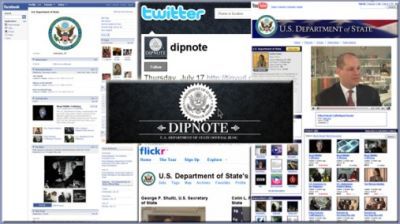HonestReporting's social media editor, Alex Margolin, contributes occasional posts on social media issues. He oversees HonestReporting on Facebook.
The Israeli Foreign Ministry may have its own flickr page and iPhone application, but it still lags far behind the US State department in using social media to achieve diplomatic goals.
According to the New York Times Magazine, Secretary of State Hillary Clinton has deemed social media as an important element in “21st century statecraft,” and assigned two staffers, Alec Ross and Jared Cohen, to push social media initiatives alongside more conventional diplomatic efforts.
Traditional forms of diplomacy still dominate, but 21st-century statecraft is not mere corporate rebranding — swapping tweets for broadcasts. It represents a shift in form and in strategy — a way to amplify traditional diplomatic efforts, develop tech-based policy solutions and encourage cyberactivism. Diplomacy may now include such open-ended efforts as the short-message-service (S.M.S.) social-networking program the State Department set up in Pakistan last fall.
The program, with its seal of government approval, has already registered a number of important achievements: In 2009, Cohen convinced Twitter to skip a planned maintenance closure so that Iranian protestors could continue using the service following Iran’s disputed election; in 2010, the State Department helped James Eberhard of Mobile Accord raise $40 million in aid for Haiti’s earthquake victims through a new system allowing donations by mobile phone text messages.
According to Ross, digital diplomacy represents a paradigm shift in political engagement.
“A lot of the 21st-century dynamics are less about, Do you comport politically along traditional liberal-conservative ideological lines?” Ross says. “Today it is — at least in the spaces we engage in — Is it open or is it closed?”
Open platforms, such as YouTube and Twitter, are the hallmark of Web 2.0 technologies, allowing people to collaborate in new ways and across great distances.
But not everyone is convinced that they represent progress in diplomatic affairs. In a widely-read essay in the Wall Street Journal, Evgany Morozov points out that the Internet and its open systems can be used by anyone for any purpose.
Hezbollah and the Muslim Brotherhood are very active online too. It's not at all guaranteed that empowering those forces by weakening the state with the help of the Internet is going to speed up the process of democratization.
Facebook and Twitter empower all groups—not just the pro-Western groups that we like. To put it in a more formal framework: not all social capital created by the Internet is bound to produce "social goods"; "social bads" are inevitable as well.
The problem Morozov describes is real – terrorists and cyber-criminals have benefited from the Internet alongside Iranian protestors and Haiti’s earthquake victims. But is possible misuse of the Internet any reason to forgo its benefits?
The answer, of course, is the opposite. Diplomats and activists must take to the Internet in large numbers. And since Hezbollah and others are already “very active” online, there is simply no time to waste.
Previously in Alex's series: Fixation Factor on Fading Facebook


